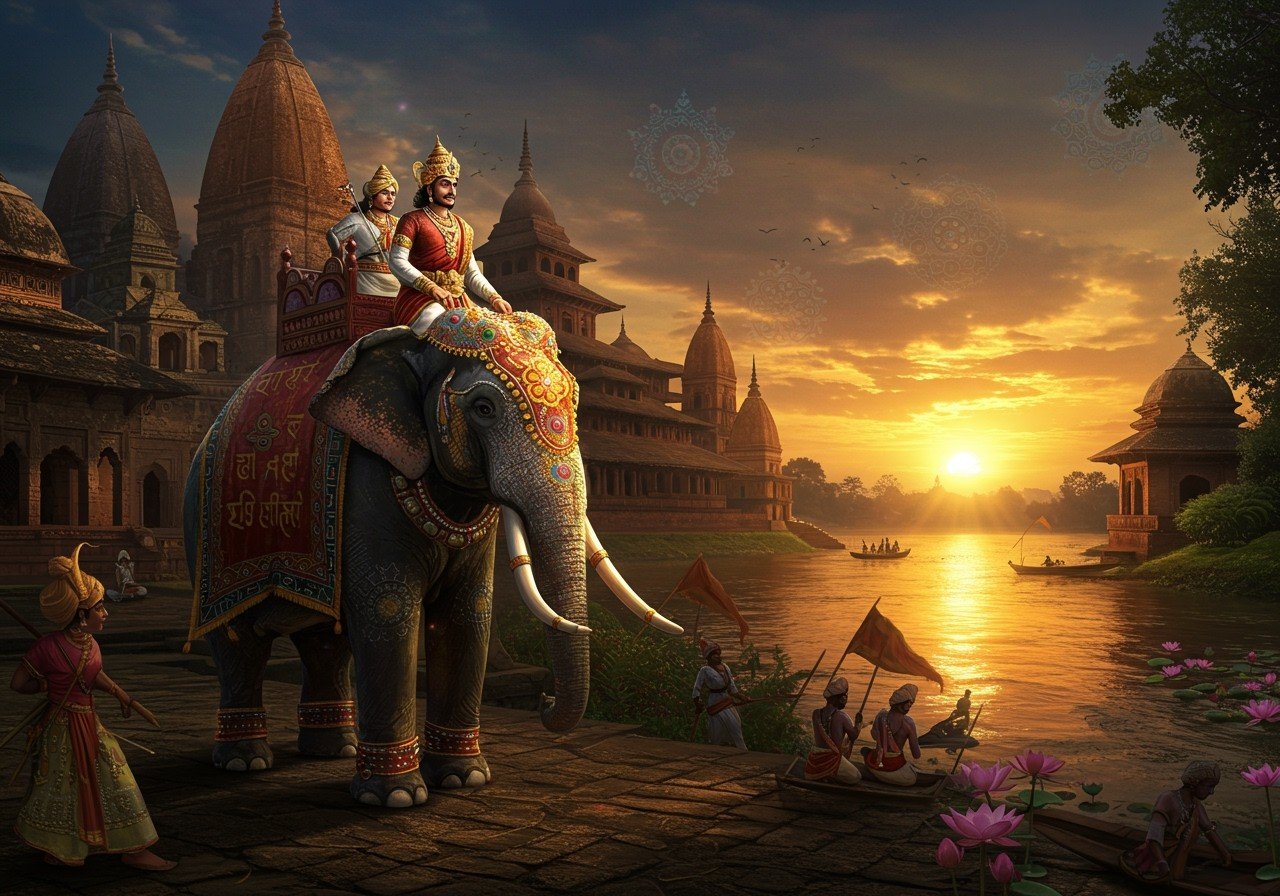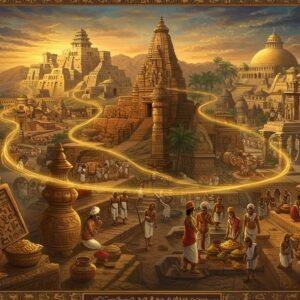
The Kamarupa Dynasty, ruling the ancient kingdom of Pragjyotisha-Kamarupa (present-day Assam and surrounding areas), holds a significant place in India’s history. Existing from approximately 350 CE to the mid-12th century CE, this kingdom flourished, initially under the Gupta Empire’s influence and later as an independent entity. This article delves into the dynasty’s history, exploring its rulers, timeline, and enduring legacy.
Origins and Rise of the Kamarupa Dynasty
The Kamarupa Dynasty emerged in the early centuries CE, establishing its roots in the fertile Brahmaputra Valley. King Pushyavarman, founder of the Varman dynasty, solidified the kingdom’s presence around the 4th century CE. The region’s strategic location, abundant resources, and fertile lands contributed significantly to its growth and prosperity.
The Meaning of “Kamarupa”
The name “Kamarupa” is steeped in mythology, drawing from ancient Hindu texts. These connections to divine beings and ancient traditions add to the region’s mystique.
Early Development
Under Pushyavarman and subsequent rulers, the kingdom experienced significant expansion and consolidation of power. A stable system of governance was established, laying the groundwork for future prosperity.
Key Rulers and Political Landscape
The Kamarupa Dynasty boasted several influential rulers who shaped its trajectory.
Bhaskaravarman: A Prominent Figure
Bhaskaravarman stands out as one of the most renowned kings of the Kamarupa Dynasty. Known for his diplomatic acumen and military prowess, his reign witnessed administrative reforms and a flourishing cultural landscape.
Other Important Rulers
- Narakasura: A significant figure known for expanding the kingdom’s territories and strengthening its regional influence.
- Mahendravarman: A key ruler who played a vital role in consolidating the dynasty’s power and promoting cultural patronage.
Navigating Challenges
The dynasty faced numerous challenges, including invasions and internal conflicts. However, through strategic alliances and resilient leadership, they successfully navigated these tumultuous periods.
Cultural and Religious Contributions
The Kamarupa Dynasty played a vital role in nurturing art, culture, and religion.
A Hub for Hinduism and Buddhism
The dynasty fostered an environment of religious harmony, promoting both Hinduism and Buddhism. Temples and sacred sites, such as the renowned Kamakhya Temple, were constructed during their reign, leaving a lasting spiritual legacy.
Preserving Local Traditions
The rulers of Kamarupa understood the importance of preserving local traditions and rituals. They also made significant contributions to classical Sanskrit literature.
Administrative Structure and Governance
The Kamarupa Dynasty implemented a robust administrative framework to ensure effective governance.
A Well-Defined Hierarchy
A clear hierarchical structure, from the king to local officials, ensured order and efficient administration throughout the kingdom.
Division into Provinces and Districts
The kingdom was strategically divided into provinces (Bhukti) and districts (Mandala) to facilitate streamlined governance.
Revenue System
Agriculture and trade formed the backbone of the kingdom’s economy. A well-structured revenue system supported these vital sectors, ensuring economic stability.
Legacy and Impact on Modern Assam
The Kamarupa Dynasty’s legacy continues to resonate in Assam’s cultural heritage.
Influence on Festivals and Traditions
The dynasty’s contributions are evident in the festivals, rituals, and traditions practiced in modern Assam. These cultural expressions serve as a living testament to their enduring influence.
Artistic and Architectural Heritage
The art, architecture, and literature from the Kamarupa period continue to inspire and influence the region’s artistic landscape. Ongoing preservation efforts are instrumental in uncovering and understanding their rich past.
A Source of Historical Pride
The dynasty’s impact is deeply ingrained in historical narratives, instilling a sense of pride among the people of Assam.
How Poojn Helps You Connect with Ancient Traditions
At Poojn.in, we recognize the profound connection between ancient traditions and contemporary spiritual practices. As you delve into the captivating history of the Kamarupa Dynasty, discover authentic ritual items on our platform that help you maintain these sacred connections. Camphor (Kapur), a cornerstone of Hindu rituals, is available at Poojn.in in its purest form. Known as कपूर (kapoor) in Hindi and by various names across different Indian languages, this sacred substance holds immense significance in traditional ceremonies. The divine flame of camphor, when used in rituals, symbolizes spiritual enlightenment and serves as an offering to the deities.
Poojn.in offers premium-quality camphor tablets and natural camphor blocks ideal for:
- Daily aarti ceremonies, bringing a sense of reverence and connection to the divine into your everyday life.
- Special pujas and havans, enhancing the spiritual significance of these sacred rituals.
- Temple offerings, expressing devotion and seeking blessings from the deities.
- Religious ceremonies, adding an element of purity and sanctity to these important occasions.
Our camphor products are meticulously sourced and packaged to preserve their purity and inherent medicinal properties. The antibacterial and anti-inflammatory qualities of our camphor make it suitable for both spiritual and practical applications. Explore our diverse collection of authentic puja items, including pure camphor, at Poojn.in, and experience the seamless convenience of doorstep delivery. We are committed to maintaining the sanctity and quality of these traditional items, ensuring a truly enriching spiritual experience. Explore our extensive range of products to meet all your cultural and spiritual needs.
Conclusion
The Kamarupa Dynasty’s reign represents a pivotal chapter in Indian history. Their legacy of strong leadership, cultural patronage, and robust governance continues to shape Assam’s identity. Studying their history allows us to appreciate the rich tapestry of tradition and heritage that influences the region today. This understanding fosters historical pride and encourages the preservation of our cultural roots.


